The Evolution and Impact of Handheld Plastic Extrusion Welders
In modern industrial fabrication, the integrity of plastic joins is paramount. Traditional welding methods often fall short in demanding applications, leading to the rise of advanced solutions like the hand held plastic extrusion welder. This technology represents a significant leap forward in creating robust, homogeneous welds for thermoplastic materials, addressing critical needs across various sectors. The shift towards durable, corrosion-resistant plastic infrastructure has amplified the demand for efficient and reliable welding equipment.
Current industry trends highlight an increasing adoption of plastic in construction, chemical processing, environmental protection, and water management. This growth is driven by plastics’ inherent advantages such as light weight, chemical inertness, and extended service life. Consequently, the market for high-performance welding tools, especially those offered by reputable extrusion welder suppliers, is experiencing robust expansion. Innovations focus on enhancing portability, weld quality, and operator ergonomics, making these devices indispensable for both on-site repairs and complex fabrication projects.
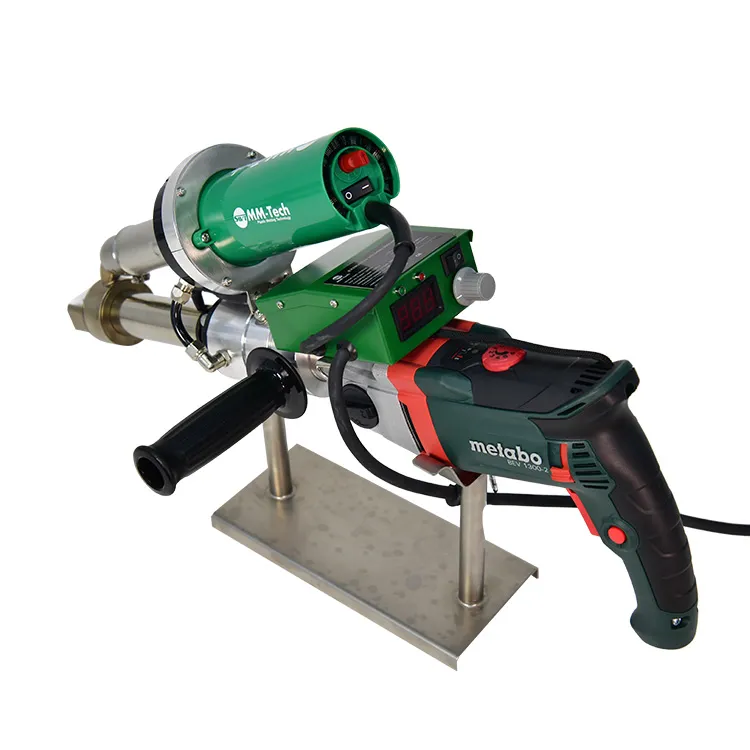
Manufacturing Process of a Handheld Plastic Extrusion Welder
The creation of a high-quality hand held plastic extrusion welder is a testament to precision engineering and advanced manufacturing techniques. The process ensures durability, performance, and compliance with stringent international standards.
- Material Selection: Components are meticulously selected for specific functions. High-grade, heat-resistant polymers (e.g., PA6+GF30 for housings) are chosen for their insulating properties and structural integrity. Critical metallic parts, such as the screw, barrel, and heating elements, are typically crafted from specialized stainless steels or high-strength aluminum alloys, ensuring corrosion resistance and optimal thermal transfer.
- Component Manufacturing:
- Casting: Used for intricate shapes like motor housings or gearboxes, ensuring precise internal geometries and material density.
- Forging: Employed for high-stress components such as gears or critical structural brackets to enhance their strength and fatigue resistance.
- CNC Machining: Essential for precision parts like the extrusion screw, barrel, and various nozzles. This ensures minimal tolerances, optimal material flow, and consistent heating. Heating elements and temperature sensors are also precision-manufactured to guarantee accurate thermal regulation.
- Assembly & Integration: Skilled technicians assemble the device, integrating electrical systems (motor, control board, heating elements), mechanical components (gearbox, screw mechanism), and pneumatic systems (air blower). Wiring harnesses are carefully routed to prevent interference and ensure safety.
- Quality Control & Testing: Each unit undergoes rigorous testing to meet international standards such as ISO 9001 for quality management and CE marking for European conformity.
- Performance Tests: Evaluate extrusion rate (e.g., 2.5-5.0 kg/h), temperature stability (e.g., ±5°C), weld strength, and air output.
- Electrical Safety Tests: Adherence to ANSI/UL standards for insulation resistance, ground continuity, and dielectric strength.
- Material Compatibility: Verification that the welder performs optimally across a range of common thermoplastics like HDPE, PP, and PVDF.
The expected service life under normal operational conditions is typically 5-10 years, reflecting the robust design and quality materials used.
Target industries benefiting from these highly engineered welders include petrochemical, metallurgy, water supply & drainage, mining, municipal engineering, and environmental protection. The inherent advantages, such as energy-saving designs and exceptional corrosion resistance of the welds produced, make them a superior choice for critical infrastructure projects.
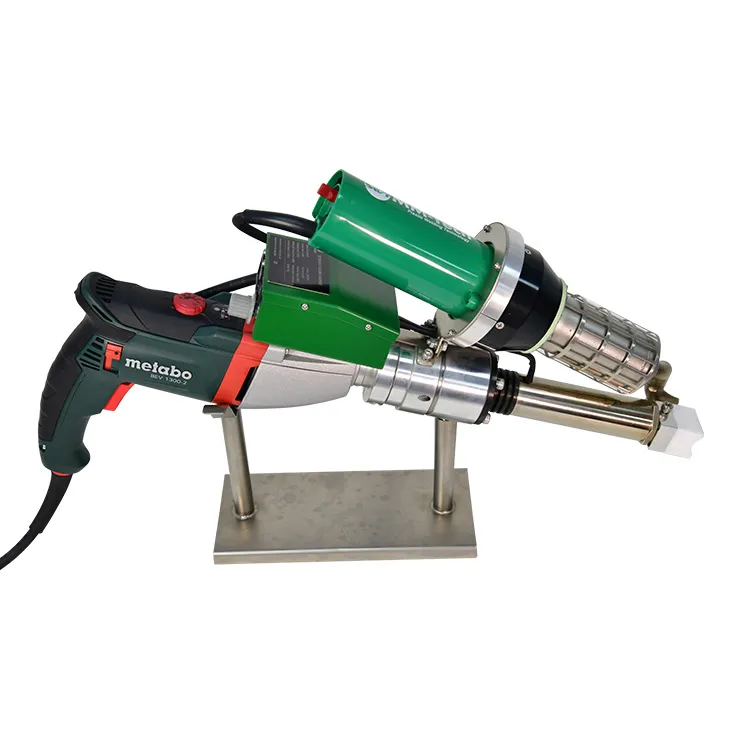
Technical Specifications: SWT-NS610A Handheld Plastic Extrusion Welder
The SWT-NS610A Handheld Plastic Extrusion Welder is engineered for superior performance, offering a blend of power, precision, and reliability. Below are its key technical parameters, showcasing its capability to meet demanding industrial requirements.
| Parameter | Value/Description |
|---|---|
| Model | SWT-NS610A |
| Input Voltage | 230V / 50Hz (Other voltages available) |
| Power | Drive motor: 1300W, Hot air: 1600W, Heater power:800W |
| Extrusion Output | 2.5 – 3.0 kg/h (PE/PP) |
| Welding Rod Diameter | 3mm – 5mm (Standard) |
| Plastic Materials | HDPE, LDPE, PP, PVDF |
| Hot Air Temperature Range | 20 – 600°C (Adjustable) |
| Extrusion Temperature Range | 50 – 380°C (Adjustable) |
| Weight | Approx. 7.5 kg |
| Dimensions (L x W x H) | Approx. 650 x 210 x 520 mm |
| Control System | Intelligent Digital Temperature Control with LCD Display |
| Safety Features | Cold Start Protection, Overheating Protection |
| Certifications | CE, ISO 9001:2015 |
This precision-engineered hand held plastic extrusion welder offers exceptional control over welding parameters, crucial for achieving consistent and high-strength welds in critical applications. The digital display provides real-time feedback, empowering operators to maintain optimal conditions throughout the welding process.
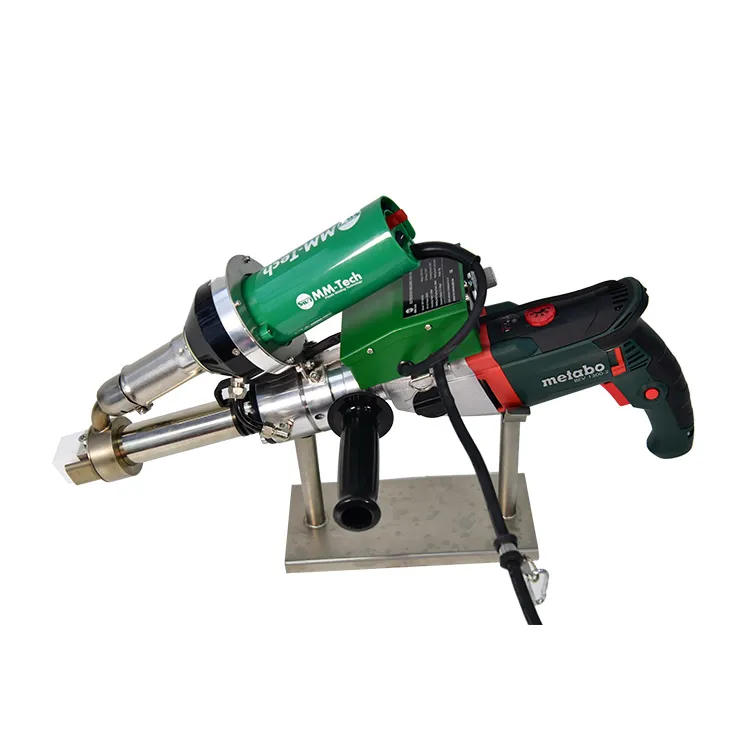
Key Technical Advantages and Performance Excellence
The design philosophy behind the SWT-NS610A hand held plastic extrusion welder centers on delivering unparalleled performance and user-centric advantages, critical for maximizing productivity and weld quality in challenging industrial environments.
- Superior Weld Integrity: Unlike traditional hot-air welding, extrusion welding introduces molten plastic material into the weld joint under pressure, ensuring molecular fusion and creating a homogeneous, monolithic weld that is often stronger than the parent material. This process minimizes porosity and creates a durable, leak-proof seal.
- Versatility Across Polymers: The precisely controlled heating zones and adjustable extrusion rates allow for optimal welding of various thermoplastics, including HDPE, PP, PVDF. This adaptability is crucial for industries working with diverse plastic compositions, from geomembranes to chemical storage tanks.
- Ergonomic Design & Portability: Weighing approximately 7.5 kg, the SWT-NS610A is designed for extended use with minimal operator fatigue. Its compact form factor facilitates access to confined spaces and simplifies on-site operations, significantly enhancing efficiency compared to larger, more cumbersome equipment.
- Advanced Temperature Control: Equipped with an intelligent digital control system, the welder ensures precise and consistent temperatures for both the hot air preheating and the molten extrusion material. This critical feature prevents material degradation and ensures optimal fusion, vital for weld strength and longevity.
- High Extrusion Output: With an impressive output of up to 5.0 kg/h for PE/PP, the welder significantly speeds up the welding process, especially for large projects and thick materials, leading to substantial time and cost savings.
- Robust Construction & Safety: Built with high-quality, durable materials, the welder is designed for rigorous industrial use. Integrated safety features like cold-start protection (preventing extrusion before optimal temperature is reached) and overheating protection safeguard both the equipment and the operator, extending service life and ensuring safe operation.
Application Scenarios & Real-World Case Studies
The versatility and robust performance of the hand held plastic extrusion welder make it an indispensable tool across a broad spectrum of industrial applications where reliable plastic fabrication is critical.
Typical Application Areas:
- Geomembrane Lining Systems: Essential for landfill sites, wastewater treatment ponds, mining heap leach pads, and secondary containment for chemical storage. The welder ensures impermeability and structural integrity of large-scale plastic liners, preventing environmental contamination.
- Pipeline Construction & Repair: Used for welding large-diameter plastic pipes (HDPE, PP) in water supply and drainage systems, gas distribution, and industrial process piping. Its portability is crucial for on-site repairs and connecting complex pipe networks.
- Chemical Storage Tanks & Fume Hoods: Critical for fabricating and repairing acid/alkali resistant tanks, ventilation ducts, and process equipment in chemical plants, ensuring robust, corrosion-resistant joints for aggressive media.
- Marine & Aquaculture Applications: For constructing and repairing large plastic structures like floating docks, fish farming cages, and marine pontoons, where durability and resistance to harsh environments are key.
- Ventilation Systems & Air Ducts: Fabrication of custom plastic ducting and fittings in industrial settings to handle corrosive fumes or maintain cleanroom environments.
Application Case Studies:
Challenge: A municipal water treatment plant required the installation of large HDPE settling tanks and a complex network of PP pipes for chemical dosing. Traditional welding methods were proving too slow and prone to minor leaks, impacting project timelines and operational integrity.
Solution: The project utilized the SWT-NS610A hand held plastic extrusion welder. Its high extrusion output and precise temperature control allowed for rapid, high-quality welding of thick HDPE sheets for the tanks and various diameters of PP pipes.
Outcome: The plant achieved a 30% reduction in welding time and passed all hydrostatic pressure tests on the first attempt, demonstrating superior weld strength and leak-proof performance critical for public infrastructure.
Challenge: An aging chemical processing facility needed to replace corroded steel ventilation ducts with PVDF-lined plastic alternatives due to exposure to aggressive chemical fumes. The intricate shapes and confined spaces presented significant fabrication challenges.
Solution: Specialized welding technicians employed the SWT-NS610A to fabricate custom PVDF ducting sections on-site. The welder’s precise hot air and extrusion temperature control were crucial for working with PVDF’s specific material properties.
Outcome: The new PVDF ventilation system exhibited excellent chemical resistance and structural integrity. The use of the portable extrusion welder significantly reduced the need for pre-fabrication, allowing for quick adjustments and high-quality welds in situ, leading to a safer and more durable installation.
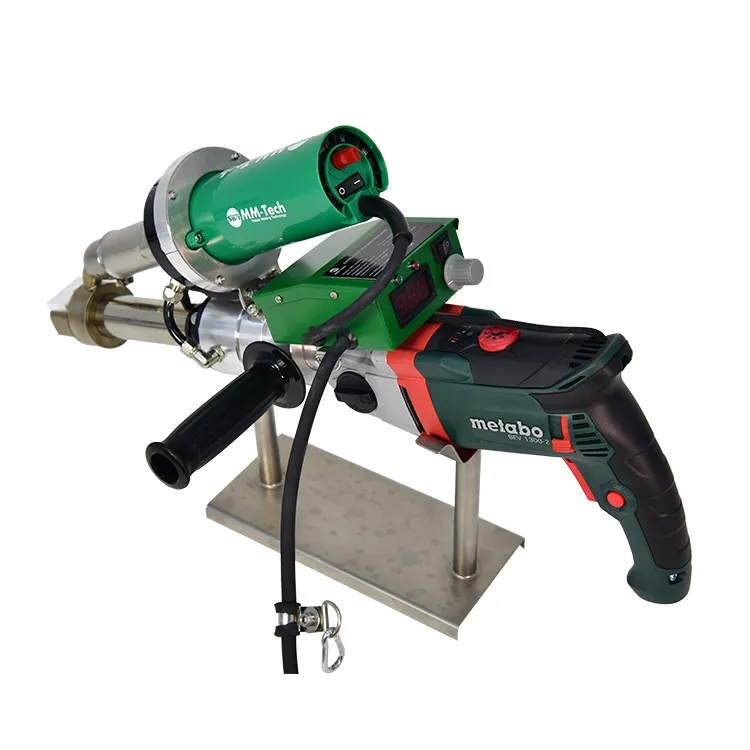
Vendor Comparison and Customized Solutions
Selecting the right hand held plastic extrusion welder involves more than just reviewing technical specifications; it necessitates a comprehensive evaluation of `extrusion welder suppliers` to ensure long-term support and value. While specific brand comparisons are beyond this scope, key considerations for B2B decision-makers are crucial.
Key Factors in Evaluating Extrusion Welder Suppliers:
- Research & Development Capabilities: Leading suppliers invest heavily in R&D to enhance welder performance, energy efficiency, and material compatibility. This ensures access to cutting-edge technology.
- Manufacturing Quality & Certifications: Look for suppliers with robust quality control processes and international certifications (e.g., ISO 9001, CE, UL) that validate product safety and performance.
- After-Sales Support & Service: Availability of technical support, spare parts, repair services, and operator training programs is vital for minimizing downtime and maximizing equipment lifespan.
- Global Distribution & Logistics: For international operations, a supplier with a strong global network ensures timely delivery and local support.
- Experience & Reputation: Years in the industry and positive customer testimonials or case studies can indicate reliability and a deep understanding of customer needs.
Customized Solutions:
Many industrial applications have unique requirements that standard equipment cannot fully address. Reputable extrusion welder suppliers often provide customized solutions to cater to specific project demands. These can include:
- Specialized Welding Nozzles: Development of custom-shaped nozzles for specific joint geometries or access into unusually tight spaces.
- Material-Specific Configurations: Tuning the welder’s heating profiles and screw designs to optimize performance for exotic or specialty thermoplastic materials beyond standard HDPE/PP.
- Enhanced Control Systems: Integration with data logging capabilities or advanced process monitoring for highly regulated industries.
- Power & Portability Adapters: Options for different power inputs or battery-powered solutions for remote field operations where grid power is unavailable.
Engaging with suppliers who offer these tailored services ensures that the investment in a hand held plastic extrusion welder perfectly aligns with the project’s unique challenges and delivers maximum operational efficiency and weld quality.
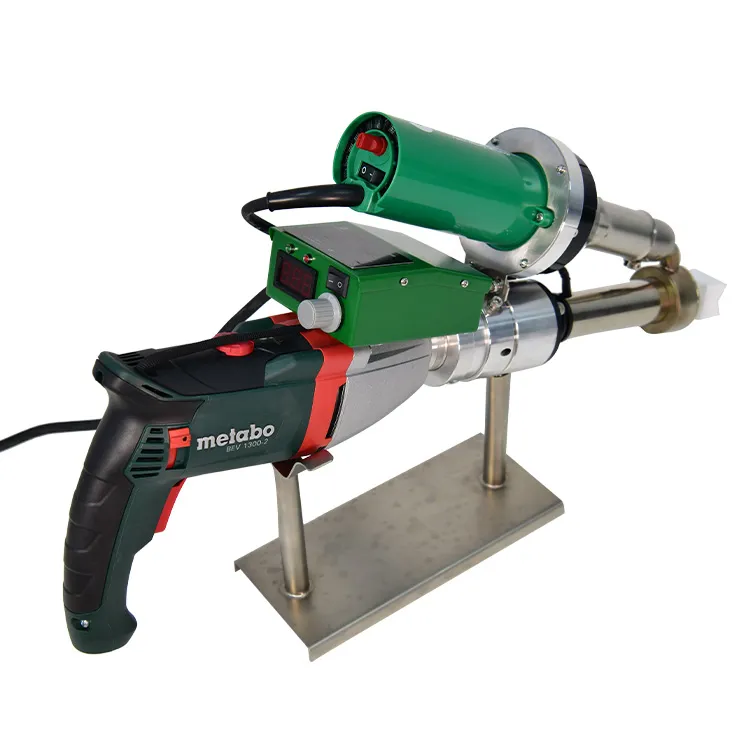
Ensuring Quality, Authoritativeness, and Trustworthiness ()
In the B2B landscape, the decision to invest in equipment like a hand held plastic extrusion welder is heavily influenced by the supplier’s commitment to quality, industry authority, and trustworthiness. Manufacturers like MM-Techweld adhere to rigorous standards to build confidence.
Authoritativeness:
- Certifications: Products are typically certified with international standards such as CE (Conformité Européenne) for safety, health, and environmental protection in the European Economic Area. Furthermore, adherence to ISO 9001:2015 for Quality Management Systems demonstrates a commitment to consistent quality and customer satisfaction. Compliance with relevant ANSI (American National Standards Institute) or other national safety standards ensures broad market acceptance and operational safety.
- Industry Experience: Companies with significant years of service (e.g., over a decade) in manufacturing and supplying plastic welding equipment accumulate invaluable expertise. This experience translates into refined product designs, robust manufacturing processes, and deep insights into market needs.
- Partnerships & Client Base: Collaborations with leading industrial clients and a strong track record of successful deployments across diverse sectors (e.g., petrochemical giants, municipal water authorities) underscore a manufacturer’s authoritative standing.
Trustworthiness:
Frequently Asked Questions (FAQ):
A1: The SWT-NS610A is primarily designed for welding HDPE, PP, PVDF. Its precise temperature controls allow for optimal processing of these common industrial thermoplastics.
A2: Standard lead times for the SWT-NS610A generally range from 2-4 weeks, depending on order volume and specific customization requirements. Expedited shipping options are often available upon request.
A3: A standard 12-month manufacturer’s warranty typically covers defects in materials and workmanship. Extended warranty options and service contracts are often available for prolonged peace of mind.
A4: Comprehensive after-sales support includes technical assistance via phone or email, availability of genuine spare parts, maintenance guides, and, in many cases, on-site or virtual training for operators to ensure optimal use and upkeep of the welding equipment.
Lead Time & Fulfillment:
Efficient logistics and transparent fulfillment processes are crucial. Reputable extrusion welder suppliers provide clear estimates for manufacturing and shipping, often utilizing global distribution networks to ensure timely delivery to diverse international markets. Stock availability for popular models and components also plays a key role in minimizing project delays.
Warranty Commitments:
A robust warranty policy, typically covering mechanical and electrical components for a specified period, signals confidence in product quality. Clear terms and conditions for warranty claims, along with readily accessible support, bolster customer trust.
Customer Support & Training:
High-quality customer service, including accessible technical support, readily available spare parts, and comprehensive operator training programs, are foundational to trustworthiness. This ensures that users can maximize their investment and maintain operational efficiency throughout the equipment’s lifespan.
Conclusion
The advancement of the hand held plastic extrusion welder, exemplified by models like the SWT-NS610A, signifies a critical evolution in plastic fabrication. Its ability to deliver high-strength, homogeneous welds with precision and efficiency addresses the growing demands of modern industries. From enhancing infrastructure durability in municipal water projects to ensuring chemical resistance in industrial processing, these welders are proving indispensable.
As industries continue to adopt robust thermoplastic solutions, the role of reliable `extrusion welder suppliers` offering advanced technology, comprehensive support, and tailored solutions will only expand. Investing in a high-quality hand held plastic extrusion welder is an investment in operational efficiency, weld integrity, and long-term project success, ensuring that plastic structures meet the most stringent performance criteria for years to come.
References
- Crawford, R.J., & Throne, J.L. (2002). Rotational Molding of Plastics. William Andrew.
- Gedde, U. W. (1995). Polymer Physics. Chapman & Hall.
- Goodfellow, J.M. (2012). Polymer Welding Handbook. Hanser Publications.
- Standard Practice for Nondestructive Examination of Welds in Thermoplastic Liner Systems. ASTM D5820-95 (2012). ASTM International.
- Technical Specification for the Fusion Welding of Polyethylene Pipes. ISO 21307:2017. International Organization for Standardization.
MM-Tech, established in 2011, is a leading manufacturer of thermoplastic welding equipment in China.hot air plastic welder We specialize in the research, development, production, and sales of thermoplastic welding equipment.hot air welding gun Our product line is extremely rich, covering geomembrane welders, polymer hot air welders, tarpaulin hot air welders, hot air welders, hand extrusion welders, and various welding tools, comprehensively meeting the diverse needs of both on-site construction and workshop operations.hot air welder roofing Our products have been exported to over 100 countries and have won the trust of more than 3,000 customers.plastic welding heat gun|super blog